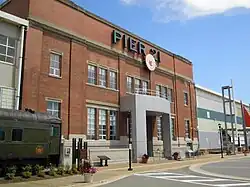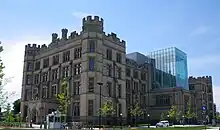The national museums of Canada (French: musées nationaux du Canada) are the nine museums in Canada designated under the federal Museums Act and operated by the Government of Canada. The national museums are responsible for "preserving and promoting the heritage of Canada and all its peoples" and serving as "a source of inspiration, research, learning and entertainment... in both official languages."[1]
There are many other museums owned and operated by the Canadian federal government that are not considered national museums. The Bank of Canada Museum in Ottawa, Correctional Service of Canada Museum in Kingston, and the National Historic Sites of Canada operated by Parks Canada across the country are all examples of museums administered by federal agencies but outside the national museums system.
History
Origins
The concept of a "National Museum" in Canada had its beginnings on 16 May 1856, when the government of the Province of Canada authorized the Geological Survey of Canada to establish a Geological Museum in Montreal (then, the capital of the province). Once moved to Ottawa, the museum's scope gradually expanded; the National Museum of Canada was officially created from the Museum Branch of the federal Department of Mines on 5 January 1927.
National Museums of Canada Corporations
The National Museums of Canada Corporation (NMC) (French: Société des musées nationaux du Canada) was created in 1967. It included the National Gallery of Canada Corporation, the Canadian Museum of Civilization Corporation, the Canadian Museum of Nature Corporation, and the National Museum of Science and Technology Corporation (now the Canada Science and Technology Museum Corporation). The Canadian Conservation Institute, the Museum Assistance Program, The National Museum Library, and other miscellaneous museum and administrative offices were also under the NMC umbrella. The corporation was formalized under The National Museums Act which took effect on 1 April 1968. The NMC operated until 1988.[2]
List of museums
There are currently nine museums included in the national museums system.[3] Of these nine, seven are located in the National Capital Region, one in Western Canada, and one in Atlantic Canada. Four of the museums are incorporated as independent Crown corporations that report to Parliament through the Minister of Canadian Heritage. The Canadian Museum of History Corporation manages the Canadian War Museum and Canadian Museum of History and a sixth Crown corporation, Ingenium, manages the three museums focused on applied sciences.
| Image | Museum | Location | Established | Management |
|---|---|---|---|---|
 |
Canada Agriculture and Food Museum | Ottawa, Ontario | 1983 | Ingenium |
 |
Canada Aviation and Space Museum | Ottawa, Ontario | 1982 | |
 |
Canada Science and Technology Museum | Ottawa, Ontario | 1968[note 1] | |
 |
Canadian Museum of History | Gatineau, Quebec | 1968[note 1] | Canadian Museum of History corporation |
| Canadian War Museum | Ottawa, Ontario | 1942 | ||
 |
Canadian Museum for Human Rights | Winnipeg, Manitoba | 2014 | Independent Crown corporation |
 |
Canadian Museum of Immigration at Pier 21 | Halifax, Nova Scotia | 2011 | |
 |
Canadian Museum of Nature | Ottawa, Ontario | 1968[note 1] | |
.jpg.webp) |
National Gallery of Canada | Ottawa, Ontario | 1880 |
See also
Notes
- 1 2 3 The institution traces its origin to the defunct National Museum of Canada. The National Museum of Canada was a former museum that was reorganized in 1968, with its various departments spun-off into separate museums. The natural history branch became the Canadian Museum of Nature, the human history branch became the Canadian Museum of History, the science and technology branch became the Canadian Science and Technology Museum.
References
- ↑ "Museums Act". Act No. S.C. 1990, c. 3, of 21 June 2018. Parliament of Canada.
- ↑ Bothwell, Robert (2009). "National Museums of Canada". Museums, Galleries and Archives. The Canadian Encyclopedia. Retrieved 2009-07-01.
- ↑ "National museums". 11 September 2017.